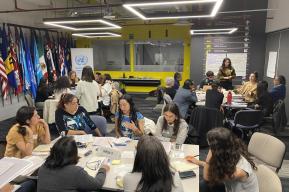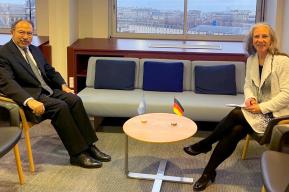News
Key Partners Reflect on a Decade of UNESCO Judges’ Initiative: Lessons learned and the Path Forward

This event served as a unique opportunity to bring together key partners and reflect on the achievements of UNESCO’s global capacity-building programme for the judiciary. It highlighted the Initiative’s crucial role in shaping the future of freedom of expression and the safety of journalists worldwide.
The success of the Judges’ initiative has hinged on critical partnerships established with Supreme Courts, Regional and Community Courts, international bodies and professional associations such as the International Association of Prosecutors (IAP) and academic institutions such as the Knight Center at Texas University and the Bonavero Institute of Human Rights at Oxford University.
During her presentation, Ms Kate O’Regan, Director of the Bonavero Institute of Human Rights at the University of Oxford, emphasized the importance of partnership and the need for confidential spaces to foster judicial dialogue. She highlighted the the recent Judicial Symposium in September 2023, bring together 15 Chief Justices and high-level judges from five regions, representing a combined jurisdiction of over 4 billion people. The symposium focused on strengthening the Rule of Law and Freedom of Expression.
Acknowledging the decade’s trend of democratic backsliding, Ms O’Regan stressed the importance of protecting freedom of expression in the ever evolving digital ecosystem.
There is probably no area of law that is growing as rapidly as freedom of expression, it is thus very important that we put together the material to address these complicated questions as they arise.
Mr Han Moraal, Secretary-General of IAP, highlighted the pivotal role that the UNESCO-IAP partnership in implementing international standards in prosecutorial conduct. Moraal discussed various initiatives, including the Syracusa International Institute for Criminal Justice and Human Rights, the IAP annual conference in Georgia with over 300 prosecutors in attendance, and the MOOC for prosecutors attended by more than 1500 prosecutors from around the world. He emphasised the shared interest between prosecutor and the journalist in promoting human rights and maintaining fairness in society.
Prosecutors play a role in getting justice done between investigators and the judiciary. It is essential to have a well balanced and fair prosecution to be executed in an independent way free of pressure according to the rule of law. Such a position makes prosecutors vulnerable to unjust pressure, exactly the same as journalists and often, the one is annoying the other, but prosecutors and journalists cannot do without each other. Both share the same interest in raising the level of fairness in society.
Swedish ambassador to UNESCO and the OECD, Ms Helena Sångeland reiterated Sweden’s commitment to supporting freedom of expression, journalists safety and human rights. As a significant contributor to the Multi-Donor Programme (MDP) as well as a founding donor of the Judges’ Initiative through the Swedish International Development Agency (SIDA), Sweden has played an essential role since its inception in Latin America in 2013.
Sweden choses to work with both right-holders that is, individuals such as journalists and others, and duty-bearers, because judges and prosecutors are representatives of the State and have a duty to protect, promote, and implement all human rights and fundamental freedoms. It is of the utmost importance that we provide the tools and knowledge to fulfill those duties.
Ms Hélène Tigroudja, Member of the UN Human Rights Committee and an expert for the judiciary trainings, shared insights gained from her missions with UNESCO, addressing complexities in implementing international standards, gender perspective on journalist safety and the judiciary’s growing interest in artificial intelligence and technology. Ms Tigroudja emphasized the need for systematic collaboration between vital stakeholders, law enforcement agents, and judiciary.
The Judges’ Initiative
Since its launch in 2013, the Judges’ Initiative has increased the capacity of judicial actors in over 160 countries on international and regional standards on freedom of expression, access to information and the safety of journalists. Over 36,000 judicial actors, including judges, prosecutors, and lawyers, have received training through Massive Open Online Courses (MOOCs), regional workshops, on-the-ground trainings, workshops for high courts judges and prosecutors.
The Judges’ Initiative is a crucial instrument in promoting justice and safeguarding the principles of free expression on a global scale.

The report on the Judges’ initiative, and the video explainer: How can the judiciary protect freedom of expression?, provide testimonies from the key partners, illustrating the outreach and achievement of this global initiative in fostering the rule of law and freedom of expression.






